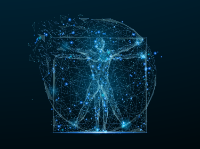What Is the Internet of Bodies?
While not widely known, the term "Internet of Bodies" (or internet of humans) has been around at least since 2019. It means the connection of a human system to the internet through a variety of devices that are ingested, implanted, or otherwise used to transmit an individual's data to a cloud or internet domain where it can be used, shared, or stored.
Nearly everyone is aware of "body external" devices, such as Fitbits or Apple watches that monitor heart rate and other functions during exercise workouts. Internal devices like pacemakers, cochlear implants, and other third-generation technologies are embedded, and these devices now have the potential to meld "technology and the human body with a real-time connection to a remote machine."
In 2020, the Rand Corporation studied what it called this "phenomenon" of the Internet of Bodies, or IoB, and warned that we are entering "uncharted territory":
- The IoB is actually an ecosystem. It's a bunch of devices that are connected to the internet that contain software and either collect personal health data about you or can alter the body's function. We think of the Internet of Bodies as this collection of all these devices, as well as all the data that the devices are gathering about you. And in healthcare, Internet of Bodies has been around for quite a while... It makes a lot of sense to connect your pacemaker to the internet so that your doctor can be automatically notified if something weird happens, if there's an anomaly. It's natural in a lot of ways to want to understand more about your body, how it functions, how well it's doing.
But Rand warned about the lack of regulation and thus the lack of protection of highly personal data. "The rise of devices that connect the human body to the web is accelerating rapidly" they wrote. "This Internet of Bodies could revolutionize health care and improve our quality of life.  But without appropriate guardrails, it could also jeopardize our most intimate personal information and introduce ethical concerns."
But without appropriate guardrails, it could also jeopardize our most intimate personal information and introduce ethical concerns."
Perhaps one of the most troubling IoB devices is known as the "smart pill." These are pills that contain edible electronic sensors and computer chips. As Forbes Magazine stated in a December 2019 article: "Once swallowed, these digital pills can collect data from our organs and then send it to a remote device connected to the internet." The pills' sensors essentially rat patients out to their physicians as to whether or not they have taken their medication. This might make sense for an Alzheimer's patient assuming there is no caregiver, but what if a patient doesn't want to take a pill that is making him or her sick or for some other reason? Before he or she can even contact the healthcare provider, the "smart pill" has transmitted an alert.
The Rand Corporation cautioned of the risks to the "uniquely sensitive data these devices collect" and the ominous potential not yet realized. "There are a lot of unknowns that we need to be careful about," they wrote in an obvious understatement.
One thing is certain, the potential exists not only for the monitoring of individuals' health, including mental health — there are apps for that as well — but also for tracking their everyday movements from birth until death. Forbes described how a bioengineering company called Biohax "embedded chips in more than 4,000 people primarily for convenience." In another instance, they reported on how 50 employees agreed to have an RFID microchip implanted, which would allow them to gain access to their company's building without a key, and "pay for items with a wave of their hand at the vending machine" by deducting the amounts owed from their bank accounts.
Given the unlimited potential for abuse such intrusions pose, it's easy to see why researchers like Alison McDowell are sounding the alarm. The technologies for turning the human body into the latest data platform already exist, thereby at least theoretically allowing for the monitoring, tracking, and controlling of the vast majority of human beings.
With the digital genie out of the bottle, how long will it be before governments, in step with non-governmental organizations, technology-development companies, foundations, and advanced university technology departments, take total control of our lives?
Want to be notified of new
Education Reporter content?
Your information will NOT be sold or shared and will ONLY be used to notify you of new content.
Click Here
Return to Home Page
